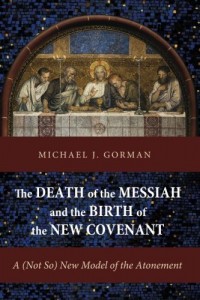The Missio Alliance Essential Reading List of 2014: Fifteen Books We Love!
Since it’s customary this time of year to put together all manner of “best of” lists, we figured we’d put together a list of some of our favorite books from 2014. Now, mind you, there are many books we haven’t had a chance to read, so this is hardly an objective list. And there are other GREAT books we HAVE read that we can’t include in the interest of space.
But alas, these are some of our favorites – especially because they each contribute something important to the conversation about being the church for God’s mission in post-Christian North America. And since we are heading into 2015 when the clock strikes twelve, here are 15 books we love, in alphabetical order:
1. The Death of the Messiah and the Birth of the New Covenant – Michael J. Gorman, Cascade Books.
The publisher: “In this groundbreaking book, Michael Gorman asks why there is no theory or model of the atonement called the “new-covenant” model, since this understanding of the atonement is likely the earliest in the Christian tradition, going back to Jesus himself. Gorman argues that most models of the atonement over-emphasize the penultimate purposes of Jesus’ death and the “mechanics” of the atonement, rather than its ultimate purpose: to create a transformed, Spirit-filled people of God.”
Scot McKnight: “Michael Gorman in The Death of the Messiah and the Birth of the New Covenant, has accomplished keeping our eyes on what is known: that in the death and resurrection of Jesus, God has formed a new covenant people.”
2. Disunity in Christ: Uncovering the Hidden Forces That Keep Us Apart – Christena Cleveland, IVP Books.
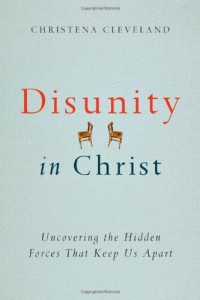 Disunity came out at the end of 2013, but we read it this year. The publisher: “Despite Jesus’ prayer that all Christians ‘be one,’ divisions have been epidemic in the body of Christ from the beginning to the present. We cluster in theological groups, gender groups, age groups, ethnic groups, educational and economic groups. We criticize freely those who disagree with us, don’t look like us, don’t act like us and don’t even like what we like. Though we may think we know why this happens, Christena Cleveland says we probably don’t.”
Disunity came out at the end of 2013, but we read it this year. The publisher: “Despite Jesus’ prayer that all Christians ‘be one,’ divisions have been epidemic in the body of Christ from the beginning to the present. We cluster in theological groups, gender groups, age groups, ethnic groups, educational and economic groups. We criticize freely those who disagree with us, don’t look like us, don’t act like us and don’t even like what we like. Though we may think we know why this happens, Christena Cleveland says we probably don’t.”
Rachel Held Evans: “What I love about Christena’s work is that it is consistently thoughtful, gracious, and PRACTICAL. Few writers are able to instruct without condescending, question without growing cynical, and challenge without hurting.”
3. Fail: Finding Hope and Grace in the Midst of Ministry Failure – J.R. Briggs, IVP Books.
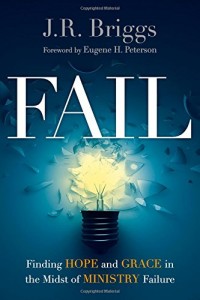 The publisher: “What do we do when we’ve failed? Some ministries are shipwrecked by moral failures like affairs or embezzlement. But for most of us, the sense of failure is more ordinary: disillusionment, inadequacy, declining budgets, poor decisions, opposition, depression, burnout. Many pastors are deeply broken and wounded, and we come to doubt that God has any use for us. J.R. Briggs, founder of the Epic Fail Pastors Conference, knows what failure feels like. He has listened to pastors who were busted in a prostitution sting or found themselves homeless when ejected from ministry. With candid vulnerability, Briggs explores the landscape of failure, how it devastates us and how it transforms us.”
The publisher: “What do we do when we’ve failed? Some ministries are shipwrecked by moral failures like affairs or embezzlement. But for most of us, the sense of failure is more ordinary: disillusionment, inadequacy, declining budgets, poor decisions, opposition, depression, burnout. Many pastors are deeply broken and wounded, and we come to doubt that God has any use for us. J.R. Briggs, founder of the Epic Fail Pastors Conference, knows what failure feels like. He has listened to pastors who were busted in a prostitution sting or found themselves homeless when ejected from ministry. With candid vulnerability, Briggs explores the landscape of failure, how it devastates us and how it transforms us.”
Brian Zahnd: “J.R. Briggs has something to say to pastors about our American obsession with ‘success.’ He holds to the Jesus-endorsed notion that those in ministry are called to faithfulness, not success, and that sometimes faithfulness takes the peculiar form of failure.”
4. A Farewell to Mars: An Evangelical Pastor’s Journey Toward the Biblical Gospel of Peace – Brian Zahnd, David C. Cook.
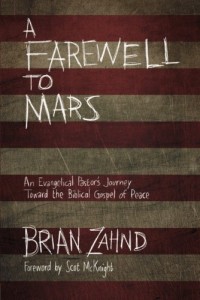 The publisher: “When did we accept vengeance as an acceptable part of the Christian life? How did violence and power seep into our understanding of faith and grace? For those troubled by this trend toward the sword, perhaps there is a better way. What if the message of Jesus differs radically from the drumbeats of war we hear all around us? Using his own journey from war crier to peacemaker and his in-depth study of peace in the scriptures, author and pastor Brian Zahnd reintroduces us to the gospel of Peace.”
The publisher: “When did we accept vengeance as an acceptable part of the Christian life? How did violence and power seep into our understanding of faith and grace? For those troubled by this trend toward the sword, perhaps there is a better way. What if the message of Jesus differs radically from the drumbeats of war we hear all around us? Using his own journey from war crier to peacemaker and his in-depth study of peace in the scriptures, author and pastor Brian Zahnd reintroduces us to the gospel of Peace.”
Eugene Peterson: “Brian Zahnd fuses his vocation as prophet and pastor into a powerful evocation of the Prince of Peace, Jesus the Peacemaker. … And the writing is simply brilliant — not a dull sentence in the book.”
5. The Future of Evangelical Theology: Soundings from the Asian American Diaspora – Amos Yong, IVP Academic.
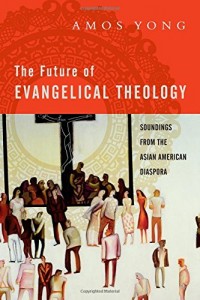 The publisher: “No longer does world Christianity converge in the Euro-American West—there has been a dramatic shift to the Global South, providing the occasion for a fresh consideration of the future of evangelical theology. Drawing on the day of Pentecost narrative, Amos Yong puts forward a bold proposal for a pentecostal-evangelical theology informed by the particular experiences and perspectives of Asian Americans. The outpouring of Christ’s Spirit upon all flesh means that the evangelical church has to attend to the multiplicity of voices and contexts that shape the global theological conversation.”
The publisher: “No longer does world Christianity converge in the Euro-American West—there has been a dramatic shift to the Global South, providing the occasion for a fresh consideration of the future of evangelical theology. Drawing on the day of Pentecost narrative, Amos Yong puts forward a bold proposal for a pentecostal-evangelical theology informed by the particular experiences and perspectives of Asian Americans. The outpouring of Christ’s Spirit upon all flesh means that the evangelical church has to attend to the multiplicity of voices and contexts that shape the global theological conversation.”
Anthony Bradley: “Yong will not only increase the reader’s cultural intelligence, but the book provides the right questions and categories that all strands of American Protestantism must engage in the twenty-first century. This book is essential reading for those who care about the future of Christianity in the West.”
6. Incarnate: The Body of Christ in an Age of Disengagement – Michael Frost, IVP Books.
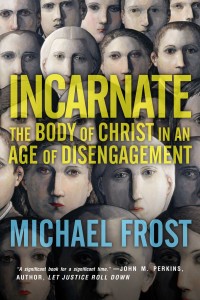 The publisher: “Christianity is increasingly understood as something personal, conceptual, interior, private, neighborless. If Jesus was God incarnate, the church is in danger of being excarnate. Michael Frost expertly and prophetically exposes the gap between the faith we profess and the faith we practice. And he offers new hope for how the church can fulfill its vocation: to be the hands and feet of Christ to one another and to our neighbors, to the ends of the earth and to the end of the age.”
The publisher: “Christianity is increasingly understood as something personal, conceptual, interior, private, neighborless. If Jesus was God incarnate, the church is in danger of being excarnate. Michael Frost expertly and prophetically exposes the gap between the faith we profess and the faith we practice. And he offers new hope for how the church can fulfill its vocation: to be the hands and feet of Christ to one another and to our neighbors, to the ends of the earth and to the end of the age.”
David Fitch: “We are all facing it–the rootless, disembodied, cyber-based existence of today’s modern world. We are struggling to live amidst flat landscapes that separate mind from body from soul. In Incarnate Michael Frost shows us how this world defies the incarnation. He unfolds the glories of returning to the body as the place where God has come in Christ to restore our lives. His writing couldn’t be more inspired. His book couldn’t be more timely.”
7. Introducing Evangelical Ecotheology: Foundations in Scripture, Theology, History, and Praxis – A.J. Swoboda, et al., Baker Academic.
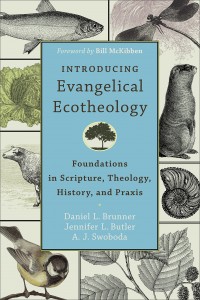 The publisher: “This evangelically centered but ecumenically informed introduction to ecological theology (ecotheology) explores the global dimensions of creation care, calling Christians to meet contemporary ecological challenges with courage and hope. The book provides a biblical, theological, ecological, and historical rationale for earthcare as well as specific practices to engage both individuals and churches. Drawing from a variety of Christian traditions, the book promotes a spirit of hospitality, civility, honesty, and partnership. It includes a foreword by Bill McKibben and an afterword by Matthew Sleeth.”
The publisher: “This evangelically centered but ecumenically informed introduction to ecological theology (ecotheology) explores the global dimensions of creation care, calling Christians to meet contemporary ecological challenges with courage and hope. The book provides a biblical, theological, ecological, and historical rationale for earthcare as well as specific practices to engage both individuals and churches. Drawing from a variety of Christian traditions, the book promotes a spirit of hospitality, civility, honesty, and partnership. It includes a foreword by Bill McKibben and an afterword by Matthew Sleeth.”
Leonard Sweet: “Sometimes you have no idea how much you needed something until it appears. Here is a desperately needed resource for the church where debates about what it means to theologize and ecologize–with the customary cries to apologize, economize, harmonize, decentralize, localize–sound more like sacks of cats than choral evensong.”
8. The Joy of the Gospel – Pope Francis, Image Books.
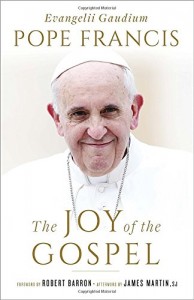 The Pope’s book came out late last year, but we read it this year. The publisher: “This special edition of Pope Francis’s popular message of hope explores themes that are important for believers in the 21st century. Examining the many obstacles to faith and what can be done to overcome those hurdles, he emphasizes the importance of service to God and all his creation. Advocating for ‘the homeless, the addicted, refugees, indigenous peoples, the elderly who are increasingly isolated and abandoned,’ the Holy Father shows us how to respond to poverty and current economic challenges that affect us locally and globally. Ultimately, Pope Francis demonstrates how to develop a more personal relationship with Jesus Christ, ‘to recognize the traces of God’s Spirit in events great and small.’
The Pope’s book came out late last year, but we read it this year. The publisher: “This special edition of Pope Francis’s popular message of hope explores themes that are important for believers in the 21st century. Examining the many obstacles to faith and what can be done to overcome those hurdles, he emphasizes the importance of service to God and all his creation. Advocating for ‘the homeless, the addicted, refugees, indigenous peoples, the elderly who are increasingly isolated and abandoned,’ the Holy Father shows us how to respond to poverty and current economic challenges that affect us locally and globally. Ultimately, Pope Francis demonstrates how to develop a more personal relationship with Jesus Christ, ‘to recognize the traces of God’s Spirit in events great and small.’
“Profound in its insight, yet warm and accessible in its tone, The Joy of the Gospel is a call to action to live a life motivated by divine love and, in turn, to experience heaven on earth.”
9. Kingdom Conspiracy: Returning to the Radical Mission of the Local Church – Scot McKnight, Brazos Press.
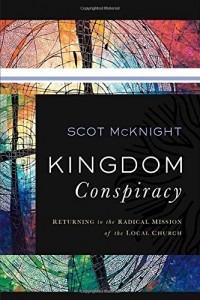 The publisher: “McKnight defines the biblical concept of kingdom, offering a thorough corrective and vision for the contemporary church. The most important articulation of kingdom was that of Jesus, who contended that the kingdom was in some sense present and in some sense in the future. The apostles talked less about the kingdom and more about the church. McKnight explains that kingdom mission is local church mission and that the present-day fetish with influencing society, culture, and politics distracts us from the mission of God: to build the local church. He also shows how kingdom theology helps to reshape the contemporary missional conversation.”
The publisher: “McKnight defines the biblical concept of kingdom, offering a thorough corrective and vision for the contemporary church. The most important articulation of kingdom was that of Jesus, who contended that the kingdom was in some sense present and in some sense in the future. The apostles talked less about the kingdom and more about the church. McKnight explains that kingdom mission is local church mission and that the present-day fetish with influencing society, culture, and politics distracts us from the mission of God: to build the local church. He also shows how kingdom theology helps to reshape the contemporary missional conversation.”
Greg Boyd: “Kingdom Conspiracy is one of the most important and timeliest works to be written in recent years. McKnight brings much-needed clarity to what ‘kingdom of God’ means–and doesn’t mean–and how it relates to the church and its mission. This is a book that needs to be read by everyone–scholars and laypeople alike–who wants to understand and consistently live out what it means to be a follower of King Jesus.”
10. The New Parish: How Neighborhood Churches Are Transforming Mission, Discipleship and Community – Tim Soerens, Paul Sparks, and Dwight Friesen, IVP Books.
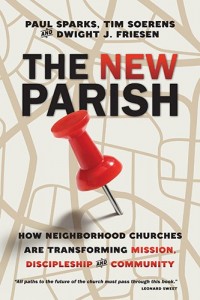 The publisher: “Paul Sparks, Tim Soerens and Dwight J. Friesen have seen—in cities, suburbs and small towns all over North America—how powerful the gospel can be when it takes root in the context of a place, at the intersection of geography, demography, economy and culture. This is not a new idea—the concept of a parish is as old as Paul’s letters to the various communities of the ancient church. But in an age of dislocation and disengagement, the notion of a church that knows its place and gives itself to where it finds itself is like a breath of fresh air, like a sign of new life.”
The publisher: “Paul Sparks, Tim Soerens and Dwight J. Friesen have seen—in cities, suburbs and small towns all over North America—how powerful the gospel can be when it takes root in the context of a place, at the intersection of geography, demography, economy and culture. This is not a new idea—the concept of a parish is as old as Paul’s letters to the various communities of the ancient church. But in an age of dislocation and disengagement, the notion of a church that knows its place and gives itself to where it finds itself is like a breath of fresh air, like a sign of new life.”
Alan Hirsch: “In a world of increasing mobility, fragmenting relationships and a loss of any real sense of covenant, we need learn again to attend to the various people and places where God has located us. This book is a much-needed antidote to the endemic alienation of our time. Missionary grow home!”
11. No Home Like Place: A Christian Theology of Place – Leonard Hjalmarson.
 The publisher: “‘The sense of being lost, displaced, and homeless is pervasive in contemporary culture. The yearning to belong somewhere, to be in a safe place, is a deep and moving pursuit. Loss of place and yearning for place are dominant images…’ (Brueggemann, The Land). Fragmentation, mobility, dualism––these forces work against our belonging, and work against our richly dwelling in the places we live. Add to these the rise of “virtual” place and relationships, and our sense of displacement only increases. It has been difficult to embrace a call to life as mission in this world under these conditions, and equally difficult to embrace a call to place. Are there “sacred” places? If every place is sacred, does the word lose its meaning? What is it that God loves about place? Can architecture contribute to our ability to engage in a place? How do experiential human questions like “belonging” intersect with a theological lens? Does a biblical view of place imply an ecology and an ethic? How do pilgrimage and place relate? How can the arts assist us in place-making? This book addresses these questions and more, in a lively dialogue between theology and culture.”
The publisher: “‘The sense of being lost, displaced, and homeless is pervasive in contemporary culture. The yearning to belong somewhere, to be in a safe place, is a deep and moving pursuit. Loss of place and yearning for place are dominant images…’ (Brueggemann, The Land). Fragmentation, mobility, dualism––these forces work against our belonging, and work against our richly dwelling in the places we live. Add to these the rise of “virtual” place and relationships, and our sense of displacement only increases. It has been difficult to embrace a call to life as mission in this world under these conditions, and equally difficult to embrace a call to place. Are there “sacred” places? If every place is sacred, does the word lose its meaning? What is it that God loves about place? Can architecture contribute to our ability to engage in a place? How do experiential human questions like “belonging” intersect with a theological lens? Does a biblical view of place imply an ecology and an ethic? How do pilgrimage and place relate? How can the arts assist us in place-making? This book addresses these questions and more, in a lively dialogue between theology and culture.”
12. Red, Brown, Yellow, Black, White: Who’s More Precious in God’s Sight? – Leroy Barber, Jericho Books.
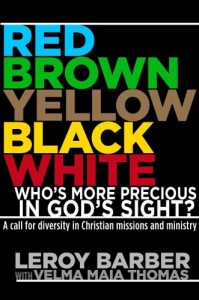 The publisher: “Drawing upon two decades of mission experience, Leroy Barber exposes the racial divisions within Christian ministries and offers practical and comprehensive solutions for promoting diversity.
The publisher: “Drawing upon two decades of mission experience, Leroy Barber exposes the racial divisions within Christian ministries and offers practical and comprehensive solutions for promoting diversity.
“RED, BROWN, YELLOW, BLACK AND WHITE highlights the historic patterns that have created racial discrepancies within missions. It joins the essential canon created by touchstone books like Divided by Faith by Michael Emerson and Christian Smith and the ever-popular Race Matters by Cornel West. With a no-blame attitude, powerful personal narratives from a dozen other black, Hispanic, Asian, Native American and white Christians, interactive histories of missions, and the writings of MLK and Howard Thurman (the entire “Letter From Birmingham Jail” and Howard Thurman’s motivational speech “Sound of the Genuine”), Barber addresses this tough issue in a way that will inspire and motivate readers of all races toward change.”
13. Slow Church: Cultivating Community in the Patient Way of Jesus – Chris Smith and John Pattison, IVP Books.
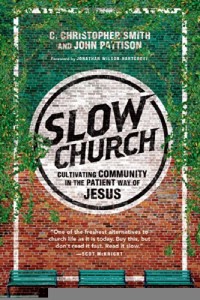 The publisher: “In the beginning, the church ate together, traveled together and shared in all facets of life. Centered as they were on Jesus, these seemingly mundane activities took on their own significance in the mission of God. In Slow Church, Chris Smith and John Pattison invite us to leave franchise faith behind and enter into the ecology, economy and ethics of the kingdom of God, where people know each other well and love one another as Christ loved the church.”
The publisher: “In the beginning, the church ate together, traveled together and shared in all facets of life. Centered as they were on Jesus, these seemingly mundane activities took on their own significance in the mission of God. In Slow Church, Chris Smith and John Pattison invite us to leave franchise faith behind and enter into the ecology, economy and ethics of the kingdom of God, where people know each other well and love one another as Christ loved the church.”
Walter Brueggeman: “This thoughtful, discerning book advocates ‘slow’ in faith and in life. This advocacy is a recognition that faith is a practice of relational fidelity that cannot be reduced to contractual or commodity transaction. The authors ponder and reflect on this summons with both pastoral sensitivity and missional passion. Readers eager for an evangelically paced life will pay close attention to this advocacy.”
14. Starting Missional Churches: Live With God in the Neighborhood – Mark Branson and Nicholas Warnes, IVP Books.
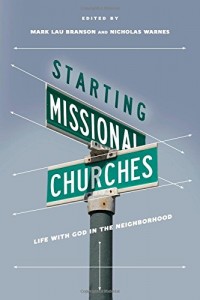 The publisher: “Using stories, interviews with pastors and a look at common preconceived notions of church planting in the West, this guide brings together resources of the missional church conversation with the creativity and energy of those who are experimenting with diverse planting activities and practices across the country. Curated by a pastor and a professor, this work highlights diverse modern examples of congregations focused on reaching their communities with a missional mindset. Learn from these stories how to build a vibrant, engaging church—one that generates redemptive witness in our neighborhoods and in our world.”
The publisher: “Using stories, interviews with pastors and a look at common preconceived notions of church planting in the West, this guide brings together resources of the missional church conversation with the creativity and energy of those who are experimenting with diverse planting activities and practices across the country. Curated by a pastor and a professor, this work highlights diverse modern examples of congregations focused on reaching their communities with a missional mindset. Learn from these stories how to build a vibrant, engaging church—one that generates redemptive witness in our neighborhoods and in our world.”
Soong-Chan Rah: “Starting Missional Churches is the necessary corrective step towards an ecclesial engagement as well as a relevant embodied practical theology. This book may prove to be the essential starter text for those engaged in both the missional and church planting movements.”
15. Theology of Mission: A Believer’s Church Perspective – John Howard Yoder, IVP Academic.
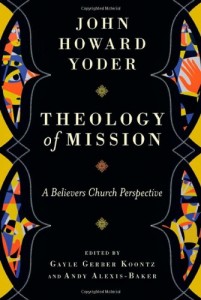 The publisher: “John Howard Yoder, author of The Politics of Jesus (1972), was best known for his writing and teaching on Christian pacifism. The material in Theology of Mission shows he was a profound missiologist as well. Working from a believers or free church perspective, Yoder effortlessly weaves together biblical, theological, practical and interreligious reflections to think about mission beyond Christendom. Along the way he traces the developments in the theology of mission and argues for an understanding of the church that is not merely a corrective but a genuine alternative. The church is missionary by nature, called to bear witness to the coming kingdom, because it serves the missionary God of the Bible ‘who comes, who takes the initiative, who reaches across whatever it is that separates us.'”
The publisher: “John Howard Yoder, author of The Politics of Jesus (1972), was best known for his writing and teaching on Christian pacifism. The material in Theology of Mission shows he was a profound missiologist as well. Working from a believers or free church perspective, Yoder effortlessly weaves together biblical, theological, practical and interreligious reflections to think about mission beyond Christendom. Along the way he traces the developments in the theology of mission and argues for an understanding of the church that is not merely a corrective but a genuine alternative. The church is missionary by nature, called to bear witness to the coming kingdom, because it serves the missionary God of the Bible ‘who comes, who takes the initiative, who reaches across whatever it is that separates us.'”
Will Willimon: “I received this manuscript when I was in the middle of teaching the Local Church in Mission class at Duke Divinity School. I read it in one day and immediately redesigned the course midsemester! John Howard Yoder taught many of us how to think about church, Christology, the politics of Jesus and Christian witness. Now he teaches us how to think faithfully about mission.”
Happy New Year, everyone!
—
[Image by Olivier Bernard, CC via Flickr]
